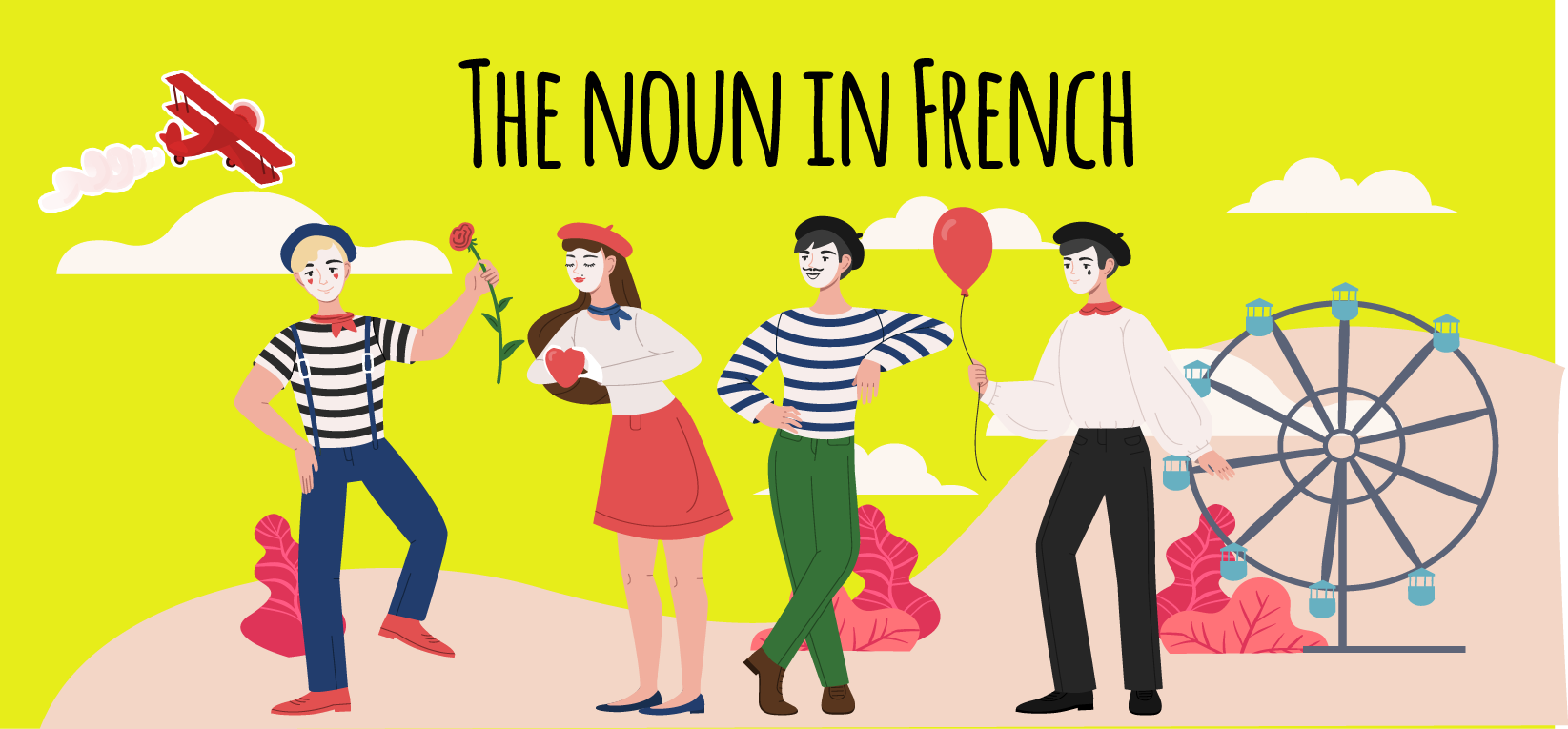The noun in French

The noun in French
ÍNDICE DE CONTENIDOS
Nouns ( les noms os ubstantifs , in French) are words that designate beings, people, animals, objects, places or abstract notions . A noun can be the subject or complement of a sentence. In French, nouns are often accompanied by an article or a determiner. Adjectives bring qualities over nouns. Nouns can be replaced by pronouns.
Examples:
- Mon perroquet adore siffler (Animal). (My parrot loves to whistle (animal)
- L’amitié vous enrichit (sentiment, concept). (Friendship enriches you (feeling, concept)
- Aujourd’hui j’ai appelé mon frère (personne). (Today I called my brother (person)
- Quel parc avez-vous vu? (endroit). (What park have you seen? (place)
- L’histoire sera editée à Noël (objet). ( The story will be edited at Christmas (object)
Learning French nouns is very important, because its structure is used in every day conversation . The only solution is to master grammar and vocabulary to be able to speak the language fluently. But first we must understand the role that French nouns play in the language.
Classification of nouns in French
Nouns can be classified into different categories in French:
- Own and common,
- Abstract and concrete,
- Countable and uncountable.
The gender of nouns in French
In French, the gender of nouns can be masculine ( masculins ) or feminine ( féminins ) . In many cases, the gender of a noun can be recognized through its ending, although this is not always possible. It is best to learn each noun with its corresponding article.
Examples:
- L’homme, le chien, le tableau, le travail, le chêne (masculin) / (man, dog, painting, work, oak (male)).
- La femme, la danseuse, la librairie, la cuisine, la France (féminin) / (the woman, the dancer, the bookstore, the kitchen, France (feminine)
Although, as a more general rule, in French masculine and feminine nouns differ, as in Spanish.
Noun rules:
- The countries have an article: if they end in -e they are feminine (except Mexico): le Portugal, la France, le Brésil, l’Espagne, le Mexique, l’Argentine
- The feminine is generally formed by adding -e to the masculine, and in some cases other letters or accents are added.
- There are nouns with different forms for masculine and feminine.
- Some professions are used only in masculine.
| Un ami (a friend) | une amie (a friend) |
| Un rival (a rival) | une rivale (a rival) |
| Un acteur (an actor) | une actrice (an actress) |
| Un musicien (a musician) | une musicienne (a music) |
| Un boulanger (a baker) | une boulangère (a baker) |
| Le detective (the detective) | la detective (the detective) |
| Le professed (The teacher) | la professeur (the teacher) |
The number: singular and plural
A noun can have different forms depending on what it represents : it can be used in the singular ( singulier ) to designate a unit, or in the plural ( pluriel ) when it designates several units. The singular and plural are the number of a noun. The plural of nouns in French is formed, as a general rule, by adding the ending -s to the singular noun, but there are plurals that are irregular.
Examples:
- J’ai acheté des pommes et des oranges au marché. (pluriel régulier) / (I bought apples and oranges at the market. (regular plural))
- Marion crée des bijoux très originaux. (pluriel irrégulier) / (Marion creates very original jewelery. (irregular plural))
Some nouns have no singular form .
| Le château (the castle) | les châteaux (the castles) |
| Le cheval (Horse) | les chevaux (horses) |
| Le bus (the bus) | les bus (the buses) |
| Le nez (nose) | les nez (the noses) |
| les gens (people) |
The categories of nouns in French
Nouns in French are basically classified into two categories: common and proper.
- Common nouns ( nom commun ) designate people, animals, places, objects, ideas, or a group of things in general. They can refer to both animate beings (for example: an enfant, a chat ) and inanimate (for example: a fauteuil, a billet de train ). Common nouns have a singular and a plural form, unless they are uncountable.
Example:
José a acheté un stylo pour écrire (singulier) / (José bought a pen to write (singular))
José a acheté deux stylos et deux stylos (pluriel) / (José bought two pens and two pens (plural))
The commons can be
Countable ( comptables ), like pomme or crayon , or uncountable ( non comptables ), like lait or eau . In addition, they can be abstract ( abstraits) , such as beauté or bonheur , or concrete ( concrets ), such as robe or assiette .
Proper name
Proper names ( nom propre ,) designate specific and unique people, animals or places . They are always written with a capital letter and are invariable. Proper names are first names, surnames, names of countries, cities, etc.
Example:
- Romain habité a Lyon . (Roman lives in Lyon)
The noun phrase
The set of words composed of a noun, which is the nucleus ( nom noyau ) of this group, and the article or determiner and adjective or adjectives that accompany it, is called “noun phrase” ( nominal groupe ) .
- Article / determinnt + nom noyau + adjectif (s) = groupe nominal (article / determiner + noun nucleus + adjective (s) = noun phrase)
Example:
- Cette magnifique plage de Marbella me fait rêver (this wonderful beach in Marbella makes me dream)
Plage is the core of the noun phrase cette magnifique plage de Marbella
And so far everything related to the noun in French. And if you want to know the next available French calls, here we leave them.




Aimer